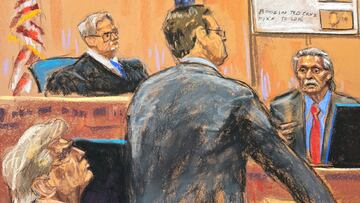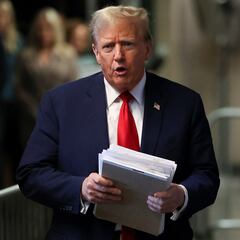Trump’s ‘Hush Money’ trial: What is the ‘catch and kill’ scheme?
Former head of AMI, publisher of National Enquirer, details in Trump’s hush money trial scheme used during 2016 campaign that has led to criminal charges.


The prosecution in Donald Trump’s first criminal trial is laying out how in the run-up to the 2016 elections there was a concerted effort to bury any damaging stories related to the then-candidate for president. The first witness called in the New York hush money criminal case to testify has been David Pecker, the former CEO of American Media which publishes the National Enquirer.
The tabloid newspaper, which is a mainstay at supermarket checkout counters around the nation, made use of its front pages to promote Trump during the 2016 presidential campaign. While at the same time denigrating his opponents, both Republican and Democrat, with salacious stories.
The rag though got itself into hot water for something else it was doing to help Trump win the 2016 race to the White House. It used a scheme knows as ‘catch and kill’ to suppress any damaging information that might hurt the then-candidate, crossing the line between “journalism” and falling afoul of campaign finance laws.
Trump’s ‘Hush Money’ trial: What is the ‘catch and kill’ scheme?
A ‘catch and kill’ scheme is where a news outlet pays for the exclusive rights to a story, the ‘catch’. However, without the intention of actually making the story public, the ‘kill’. Unlike when someone receives a hush money payment, a bribe to keep quiet, with ‘catch and kill’ they often do not realize that their story will be buried. But in both cases the party being paid enters into a legally binding non-disclosure agreement (NDA).
While neither are necessarily illegal, ‘catch and kill’ raises several ethical questions. These agreements though can cross the legal lines into criminality.
Anderson talks with @RonanFarrow who helped uncover the "catch and kill" practice at the National Enquirer and his reporting will be a key piece of evidence during Tuesday's proceedings. pic.twitter.com/9Rt2L9BcyZ
— Anderson Cooper 360° (@AC360) April 23, 2024
The Department of Justice investigated American Media and Pecker for a deal reached with former Playboy model Karen McDougal. The tabloid agreed to pay her $150,000 prior to the 2016 election, to have the exclusive rights to her story claiming that she had had a 10-month affair with Trump in 2006.
Pecker, a longtime friend of Trump, testified this week that in 2015 he told him that he would be the then-candidate’s “eyes and ears” to help his campaign. He and Dylan Howard, chief content officer at American Media, received immunity in 2018 as the payments to McDougal, and another person claiming to have damaging information on Trump, were deemed illegal campaign contributions.
Pecker helped prosecutors convict Trump’s former lawyer for hush money payments
Pecker and Howard agreed to cooperate with authorities to unravel the hush money payments made to porn star Stephanie Clifford, whose stage name is Stormy Daniels. Shortly before the 2016 election, she was paid $130,000 to keep quiet about an affair that she had had with Trump, also in 2006.
Rachel @Maddow reads from the transcript of Donald Trump's criminal hush money trial, specifically a portion about how exactly Michael Cohen was repaid $420,000 after he himself paid Stormy Daniels. pic.twitter.com/SzFxYmdnci
— MSNBC (@MSNBC) April 23, 2024
While the actual payment was made by his former lawyer Michael Cohen, he claims that his former boss ordered him to give the money to Daniels. Trump then reimbursed Cohen, according to the latter, more than double the amount to claim it as a business expense, thus the charges for fraudulent business records.
Related stories
Those normally misdemeanor charges were bumped up to felonies since the hush money scheme and cover-up were part of an effort to illegally influence the 2016 election according to the prosecution. Manhattan District Attorney Alvin Bragg has charged Trump with 34 felony counts for his actions covering up the hush money payment to Daniels.
Cohen, for his part, pleaded guilty to illegal federal campaign contributions related to the hush money payments and was sentenced to three years in prison. In the federal criminal probe, Trump was referred to as ‘Individual-1′. However, it’s been reported that the Department of Justice under then-Attorney General Bill Barr tried to kill the investigation, even pushing prosecutors to reverse Cohen’s conviction.


Complete your personal details to comment